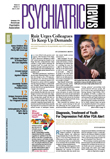Retired professional football players experience levels of depression similar to those for the general U.S. population, but they also endure high levels of chronic pain that exacerbate their depression, suggests a recent study.
Results of the study, based on answers to the Patient Health Questionnaire's nine-item depression scale (PHQ-9) sent to 3,377 members of the NFL Players Association, Retired Players Section, are published in the April Medicine and Science in Sports and Exercise, the journal of the American College of Sports Medicine.
In addition to pain, participants were asked about nutrition, exercise, alcohol use, and smoking, as well as other health issues.
Nearly 15 percent of the 1,594 who responded reported moderate to severe depression, said Thomas Schwenk, M.D., the George A. Dean, M.D., chair and Professor of Family Medicine at the University of Michigan Health System and associate director of the U-M Depression Center.
“But almost half reported problems with pain, putting them at significant additional risk for depression and associated difficulties,” he added.
Respondents were categorized as experiencing zero to mild depression (84.5 percent of respondents) or moderate to severe depression (14.7 percent). They were also categorized according to whether difficulty with pain was absent or only somewhat common (51.7 percent) versus quite or very common (47.6 percent).
Trouble sleeping, financial difficulties, marital or relationship problems, and problems with fitness, exercise, and aging were issues also frequently reported by the retired athletes. And all were strongly correlated with the presence of moderate to severe depression and with quite or very common difficulty with pain.
The same complaints were even more commonly reported by those who had both moderate to severe depression and quite or very common difficulty with pain, compared with those who had low scores in both these areas.
“In addition to the strong link between depression and pain, the relationship between these conditions and other issues also was notable,” said co-author Eric Hipple, a retired Detroit Lions quarterback, now outreach coordinator for the U-M Depression Center.
He said that NFL retirees who had moderate to severe depression were 11 times more likely to report trouble sleeping than those not depressed or mildly depressed. Similarly, those with moderate-to-severe depression were nearly eight times more likely to report that they do not exercise and have experienced a loss of fitness and seven times more likely to report financial difficulties.
The authors considered PHQ-9 scores of 0-9 as indicating no to mild depression and scores of 10-27 moderate to severe depression.
Retired players who scored high on the pain measures also had more problems in these same areas.
The moderately to severely depressed retired players were much more likely to have problems with a lack of social support or friendships; with the use of prescription medication, alcohol, or other drugs; and trouble with the transition to life after football.
Many said they would feel weak or embarrassed if they asked for help with their health problems, which acted as a barrier to solving those problems. Many dealt with their health and other issues using spiritual means or by talking with family and friends. Other roadblocks to seeking professional help included a lack of insurance coverage and a lack of recognition that these problems were important.
“What our research tells us is that this population of retired professional athletes would benefit from a proactive educational and clinical outreach programs, possibly beginning even before retirement, as a way to help improve the likelihood that retired NFL players will achieve a high quality of life after football,” Hipple told Psychiatric News. Schwenk noted that because of these factors and others, the shift from being a professional athlete to retired is a very challenging transition.
The authors recommended that future studies explore the hypothesis that the physical disabilities and chronic pain experienced by professional athletes cause significant difficulty with maintaining their fitness levels in retirement, thus placing them at higher risk for depression.
The study was supported in part by a grant from the National Football League Players Association.
An abstract of “Depression and Pain in Retired Professional Football Players” can be accessed at<www.ms-se.com> by searching the April issue contents and clicking on the article title. ▪
